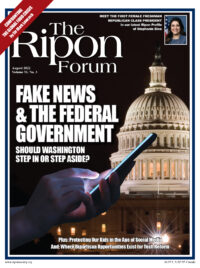
Big Tech is still in the cross hairs of Republicans and Democrats, but there is little consensus on regulating the industry. On the one side, there is agreement that American tech is a world leader and one of our most vital industries. On the other hand, concerns have been expressed about Big Tech’s size and influence. As technology continues to play an increasingly dominant role in how we connect at work and home, we must get it right.
While Congress debates partisan tech agendas, the EU is passing laws that put them in the driver’s seat of data privacy and how our tech companies operate abroad. Russia and China continue to use cyber-attacks to gain insights into classified and sensitive information while influencing political debates worldwide. Bipartisan, pragmatic solutions are needed to keep American tech innovative and robust. Specifically, three strategies have broad support to advance this goal: Enhancing Data Privacy, Securing Cyberspace, and Funding Innovation.
Bipartisan, pragmatic solutions are needed to keep American tech innovative and robust.
Before diving into those strategies, let’s look at the probable next steps: Republicans will likely take the House next year and have been vocal about their interest in investigating perceived bias against conservative speech online. Few Democrats share this priority and have instead opted to introduce proposals in the 117th Congress around anti-trust and competition issues in the tech sector. If there is an opportunity for bipartisan legislation around curbing bias and misinformation online, it is in reforming Section 230 of the Communications Decency Act, either by adding carve-outs to the existing language or passing new laws to address issues that stem from misinformation online. Section 230 provides liability protection for platforms hosting content, but in recent years exemptions have been added or proposed to hold websites more accountable for harms stemming from their content. Democrats, in this scenario, will likely continue to press Big Tech through competition and anti-trust policy but will seek to do so through the federal agency authorities. With Special Assistant to the President Tim Wu, and Chair of the FTC Lina Khan leading an activist regulatory agenda, at a minimum, we can expect to see more from the DOJ, FTC, and CFPB around regulating the tech sector.
Shifting back to opportunities for bipartisan solutions, let’s start with the most difficult – Enhancing Data Privacy. Congress has spent the last six sessions trying to pass a national data privacy law. Many believe, including me, that this is the root of techlash and that many other legislative proposals would benefit from applying federal law. The American Data Privacy and Protection Act is the latest bipartisan proposal that provides a new starting place for future considerations. With China and the European Union passing their data governance laws and US states increasingly passing their own, data privacy is increasingly dependent on the location of access. This could lead to excessive compliance costs, stalled innovation, and loss of opportunity for American citizens.
Cybersecurity is another strategy where we have seen strong bipartisan support and success in passing legislation to bolster the U.S. digital infrastructure. Cyber threats are a clear and persistent danger to Americans and must be addressed as soon as possible. Congress has several initiatives with bipartisan support that it can prioritize moving forward. These include digital identification measures to fight online fraud, supporting workforce development to train the next generation of cybersecurity professionals, and securing our digital supply chain.
Cybersecurity is another strategy where we have seen strong bipartisan support and success in passing legislation to bolster the U.S. digital infrastructure.
The last strategy is funding innovation for the next generation of American tech leadership. Many of the technologies we enjoy today started in a government research lab. We can point to the Internet, the green revolution, and others as clear examples that show government investment in tech has yielded positive returns. We know that the next leap in tech is right around the corner. Quantum computing, AI, 6G, high-capacity batteries, and beyond are research areas that will fuel American innovation in the future. While these new technology areas are promising, the support network needed to ensure we can build these systems is at risk. USICA attempts to address this issue, but there is still a need to secure the materials, expertise, and capacity to build the systems for the next generation of tech. Bipartisan lawmakers should continue to prioritize these areas as a matter of national security.
Technology will continue to be more integrated into our lives. Congress should prioritize the areas mentioned in this piece to safeguard future iterations of tech. If we don’t, we risk yielding leadership to foreign competitors and stalling innovation at home.
Tom Romanoff is the Director of the Technology Project at the Bipartisan Policy Center.




